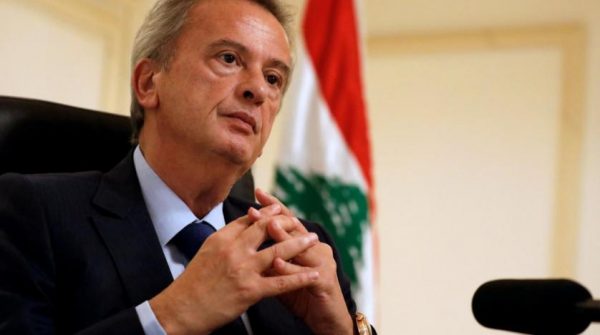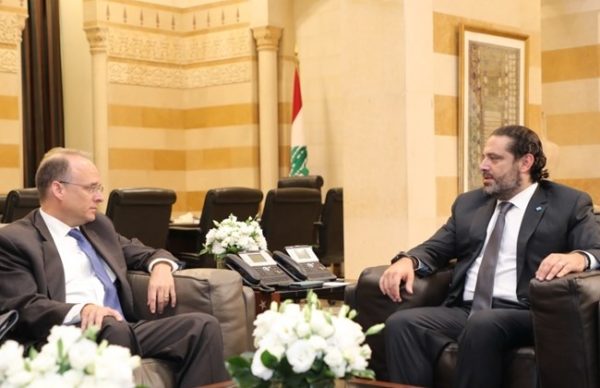
Central Bank Governor Riad Salameh on Monday assured the Lebanese about the availability of the US dollar currency in Lebanon’s banking sector, stressing that Central bank has its assets in dollars
He also brushed off concerns about the visit of the US government official to Lebanon.
“The dollar is available in the Lebanese banking sector. There is a lot of exaggeration,” Salameh said .
Salameh said that Lebanese banks were meeting customer demand for U.S. dollars which can still be withdrawn from ATMs in most banks.
“But dollars are still available in the ATMs, perhaps not in all the banks, but in most of the banks,” Salameh said.
He said any measures taken at ATMs were down to the policy of each individual bank.
Customers unable to complete transactions at the ATMs of some banks could carry them out at the counter, he said.
“The Central bank of Lebanon BDL has its assets in dollars and there is no need for special measures or media intimidation,” he added.
His comments come after some businesses say they are being forced to go to money exchange houses to secure their hard currency needs and have been charged rates above the official peg of 1,507.5 Lebanese pounds to the dollar.
Fuel distributors threatened last week to go on strike because they say banks are not supplying the dollars they need to pay importers.
“It might be for logistical reasons that perhaps some money changers do not have dollars while others perhaps do,” Salameh said.
“But I have not seen anyone actually come and present a complaint to Banque du Liban … about this matter,” he added.
“Banque du Liban has its reserves in dollars that exceed $38.5 billion and is present in the market and there is no need for any special measures especially because the fear mongering that is happening is more in the media than in the market.”
On concerns that the visit of Treasury Assistant Secretary for Terrorist Financing Marshall Billingslea to Lebanon could carry US sanctions on more Lebanese banks after sanctioning Jammal Trust Bank.
Salameh said: “Billingslea’s visit is most welcome and it does not aim to tighten the noose on Lebanon. It aims to explain the motives behind sanctions at JTB”
He stressed: “We are in constant contact with the US Treasury. It is in Lebanon’s interest to have good relations with it.”
Salameh played down reports in local media that the U.S. will impose further sanctions on the country’s banking system. He said Billingslea “is not coming here to squeeze Lebanon.

Billingslea arrived in Lebanon for a two-day visit, which will include meetings with a broad range of Lebanese officials, the US Embassy in Beirut said in a statement on Monday.
During his visit, Billingslea will highlight the strong U.S. Lebanon partnership and the U.S. government’s overall confidence in the Lebanese financial sector, said the statement.
In meetings with government and banking officials, the Assistant Secretary will encourage Lebanon to take the necessary steps to maintain distance from Hezbollah and other malign actors attempting to destabilize Lebanon and its institutions, it added.
Billingslea met with the PM Hariri and the speaker of parliament, as well as officials from the Association of Banks in Lebanon and the central bank governor.
During the meetings, Billingslea warned that US sanctions may extend beyond direct affiliates of Hezbollah, according to a source present at talks.
“The US will sanction any group that provides material support to Hezbollah, be it through supplying weapons or money,” the source quoted Billingslea as saying.
But sanctions “will not target groups who are only tied to Hezbollah politically,” he added, easing concern that the group’s political allies, including President Michel Aoun’s Free Patriotic Movement and Berri’s Amal Movement, could be targeted.
Last month, the Treasury’s Office of Foreign Assets Control sanctioned Jammal Trust Bank and added it to its list of global terrorist organizations. The bank denied U.S. charges about “knowingly facilitating banking activities” for Hezbollah militants.
The bank last week was forced to request self-liquidation and the move was accepted by the central bank governor.
The Association of Banks in Lebanon issued a circular earlier this month, calling on its members not to conduct any financial transactions or interbank operations with JTB or any bank designated by the U.S. Treasury.
The U.S. has been imposing sanctions on Hezbollah for years, as Washington considers the group a terrorist organization. Such steps have increased in recent months as the Trump administration is using “maximum pressure” against Iran, Hezbollah’s main backer.
In July, the Treasury Department targeted a Hezbollah security official and two members of Lebanon’s parliament, saying they are suspected of using their positions to further the aims of the militant group and “bolster Iran’s malign activities.” It was the first time Washington targeted Hezbollah legislators.
Hezbollah was established by Iran’s Revolutionary Guard months after Israel invaded Lebanon in 1982.
Agencies

Leave a Reply
You must be logged in to post a comment.